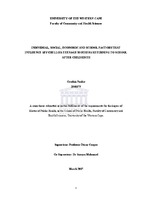Individual, social, economic and school factors that influence Seychellois teenage mothers returning to school after childbirth
Abstract
Teenage childbearing interferes with girls' educational attainment in many settings, as it frequently marks the end of their schooling. While the right to education is guaranteed in the Constitution and its Education Act of 2004, which include clauses supportive of girls' continuing their education during pregnancy and after childbirth, data show that many teenage girls do not return to school after childbirth. According to official figures, 10 out of 18 teenage mothers in the Seychelles did not return to school in 2013. A young girl terminating her education early because of pregnancy may have negative social, economic and health consequences for the individual and for the Seychelles as a country. To avoid the negative consequences that may result from pregnant teenage girls not completing school, it is important to explore the facilitating and hindering factors to young mothers returning to school after childbirth in the Seychelles. This research aimed to explore the factors that influence teenage mothers to return to school after childbirth in Seychelles. A qualitative research methodology was used, where in-depth interviews were conducted with twelve young women who were teenage mothers, and with four key informants. Amongst the young women, six had returned to school after childbirth, and six had not return to school after childbirth. The key informants were professionals including a school counsellor, a schoolteacher, a counsellor working with young mothers, as well as a professional working with a Non-Governmental Organization (NGO) that targets out of school young pregnant girls. Purposive sampling was used to access the research participants. The content of the interviews was transcribed and then analyzed using thematic analysis. The findings indicated that there were numerous factors influencing a young mother’s decision to return to school after childbirth in Seychelles. These were not limited to individual level factors such as the internal motivation of the young mothers to achieve a better future for themselves and their child, but also included other immediate and broader influential factors. Family support was crucial in determining whether a young mother would return to school after childbirth. Furthermore, the school environment was not always conducive to the retention of the teenage mothers, as often teachers’ attitudes, the rigid grade system and school uniform policy acted as deterrents for those young girls’ school return. Additionally, the school policy for pregnant learners and teenage mothers, and the lack of welfare assistance, were other hindering factors to the young women's return to school. These factors were often interconnected, and collectively impacted on those teenage mothers' decision to return to school. Teenage mothers and their children are two vulnerable groups in society. Pregnant girls dropping out of school after delivery can contribute to the chain of poverty in Seychelles, as this leads to their having lower educational attainment, reduced employment and career development opportunities. To address the issue of teenage mothers not returning to school after childbirth in Seychelles, it is important to have better mechanisms that will together tackle the multiple factors influencing their return to school. This involves adopting a health promotion approach using the Ottawa Charter. This would be done by adopting healthy policies and creating a supportive school environment with regard to teenage mothers and pregnant learners and would include the Ministry of Education working in partnership with other sectors so as to adopt a comprehensive approach to teenage mothers and schooling.

